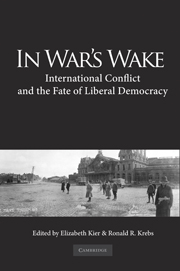Book contents
- Frontmatter
- Contents
- List of Contributors
- Acknowledgments
- 1 Introduction
- PART I WAR AND DEMOCRATIC TRANSITIONS: NEW AND DURABLE DEMOCRACIES?
- PART II WAR AND DEMOCRATIC PUBLICS: RESHAPING POLITICAL PARTICIPATION?
- PART III WAR AND DEMOCRATIC STATES: GOVERNMENT BY THE PEOPLE OR OVER THE PEOPLE?
- References
- Index
1 - Introduction
War and Democracy in Comparative Perspective
Published online by Cambridge University Press: 05 June 2012
- Frontmatter
- Contents
- List of Contributors
- Acknowledgments
- 1 Introduction
- PART I WAR AND DEMOCRATIC TRANSITIONS: NEW AND DURABLE DEMOCRACIES?
- PART II WAR AND DEMOCRATIC PUBLICS: RESHAPING POLITICAL PARTICIPATION?
- PART III WAR AND DEMOCRATIC STATES: GOVERNMENT BY THE PEOPLE OR OVER THE PEOPLE?
- References
- Index
Summary
Democracies often compromise their principles during crises: executive authority grows, rights of due process are set aside, and free expression suffers. But war's effects on liberal-democratic institutions and processes are diverse, often contradictory, and not always negative. Fear of the Soviet Union helped create the U.S. national security state, but the demands of war mobilization contributed to the advance of parliamentary institutions in nineteenth-century Europe. The Vietnam War promoted political alienation, but the vast social networks forged by America's earlier large-scale wars built a vigorous civil society. War can undermine progressive reform, or so Lyndon Johnson believed as he refrained from mobilizing the public to wage war in Vietnam, hoping thereby to save the Great Society. But European preparations for the total wars of the twentieth century laid the basis for the modern welfare state. Big wars may have big effects, but limited wars can also have substantial and pro-democratic consequences, as the Argentine junta discovered when its defeat in the Falklands delegitimized its rule and facilitated the transition to democracy. Victory, too, can usher in more open and democratic politics, as Israel learned after the Yom Kippur War.
Few questions are as important as war's effects on democracy – and few questions are as neglected. Scholars routinely allude to war's transformative power, but studies of war's effects on democratic institutions and politics are rare. Stein and Russett's call, nearly three decades ago, for research on the domestic political consequences of international conflict has, by and large, gone unanswered.
- Type
- Chapter
- Information
- In War’s WakeInternational Conflict and the Fate of Liberal Democracy, pp. 1 - 20Publisher: Cambridge University PressPrint publication year: 2010
- 3
- Cited by



